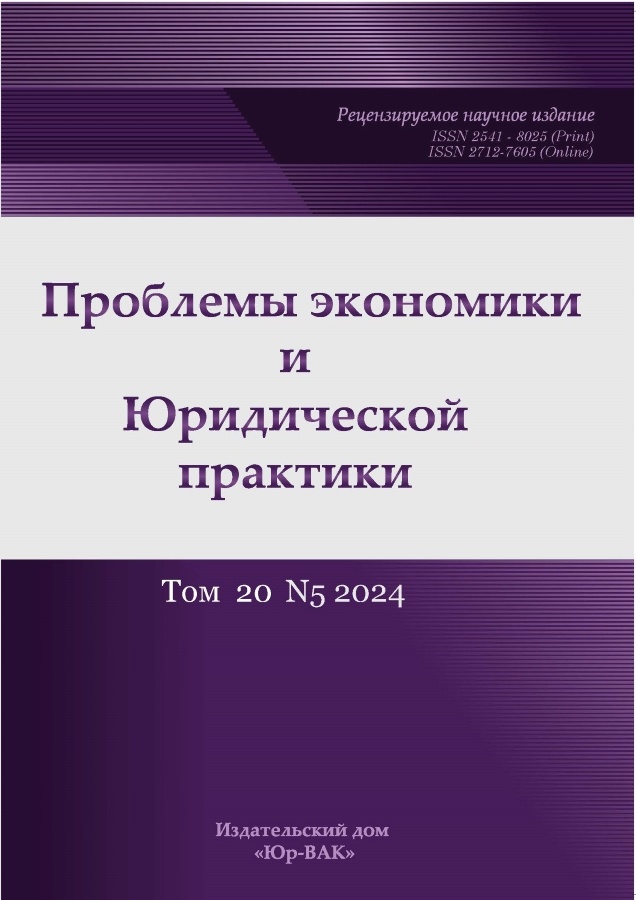Совершенствование механизма таможенного контроля экспорта нефти и нефтепродуктов из Российской Федерации и оценка его эффективности
- Авторы: Магомедов И.Р.1
-
Учреждения:
- Российская таможенная академия
- Выпуск: Том 20, № 5 (2024)
- Страницы: 178-186
- Раздел: Региональная и отраслевая экономика
- URL: https://journals.eco-vector.com/2541-8025/article/view/685673
- DOI: https://doi.org/10.33693/2541-8025-2024-20-5-178-186
- EDN: https://elibrary.ru/BQTVZP
- ID: 685673
Цитировать
Полный текст
Аннотация
Цель исследования. В условиях санкционного давления на нефтяную отрасль и обеспечения устойчивости развития национальной экономики Правительство Российской Федерации (далее—РФ) оказывает воздействие на нефтяную отрасль путем применения методов регулирования внешнеторговой деятельности (далее—ВТД). Особое место в реализации данных мер отводится таможенным органам, обеспечивающим контроль за методами государственного регулирования ВТД и благоприятные условия для осуществления ВТД участниками ВЭД посредством применения механизма таможенного контроля. В ходе исследования выявлено, что действующий механизм таможенного контроля экспорта нефти и нефтепродуктов характеризуется рядом проблем, напрямую приводящих к наличию рисковых ситуаций в процессе таможенного контроля, сопряженных с нарушением таможенного законодательства, и снижению скорости проведения таможенного контроля при одновременном понижении качества предоставления таможенных услуг. Поэтому цель данной статьи заключается в совершенствовании механизма таможенного контроля экспорта нефти и нефтепродуктов, направленного на повышение как эффективности самого контроля, так и качества предоставляемых таможенных услуг. Выводы. В работе предложен усовершенствованный механизм таможенного контроля экспорта нефти и нефтепродуктов из РФ и выработаны направления его совершенствования. Для проведения комплексной оценки эффективности механизма таможенного контроля разработана методика, включающая систему показателей и алгоритм количественной и качественной оценки.
Полный текст
Об авторах
Ибрагим Рамисович Магомедов
Российская таможенная академия
Автор, ответственный за переписку.
Email: magomedov.ir@mail.ru
SPIN-код: 8249-2496
Scopus Author ID: 1089203
старший преподаватель кафедры таможенных операций и таможенного контроля
Россия, Московская область, г. ЛюберцыСписок литературы
- Александрова О.Б., Тойшева О. А. Механизм функционирования лизинговых процессов // Вестник евразийской науки. 2014. № 5 (24). С. 3–10.
- Бычкова А.Н. Экономический механизм: определение, классификация и применение // Вестник Омского университета. 2010. № 4. С. 37–43.
- Кузякин Ю.П., Мухин А.И. Цифровая трансформация таможенного контроля: состояние и перспективы // Юридическая наука. 2023. № 8. С. 111–118.
- Макрусев В.В., Любкина Е.О. Методический инструментарий оценки качества таможенных услуг // Инновационное развитие экономики. 2021. № 2-3 (62-63). С. 163–179.
- Мумладзе Р.Г., Васильева И.В., Алешина Т.Н. Совершенствование экономического механизма управления развитием сельского хозяйства // Инновации и инвестиции. 2016. № 11. С. 205–206.
- Немирова Г.И., Магомедов И.Р. Таможенное декларирование и таможенный контроль экспорта нефти и нефтепродуктов из Российской Федерации: теория и практика: монография. Москва: РУСАЙНС, 2022. 138 с.
- Ожегов, С. И. Толковый словарь русского языка / С. И. Ожегов, Н. Ю. Шведова. —М.: Азбуковник, 2000. —940 с.
- Филиппова Л.А., Васина Е. Н., Никитченко И.И., Сомов Ю.И. Технологии искусственного интеллекта для таможенного контроля // Вестник Российской таможенной академии. 2022. № 2. С. 91–97.
- Цветков А.Н. Инновационный императив для России: монография. СПб.: Питер, 2010. 218 с.
Дополнительные файлы













